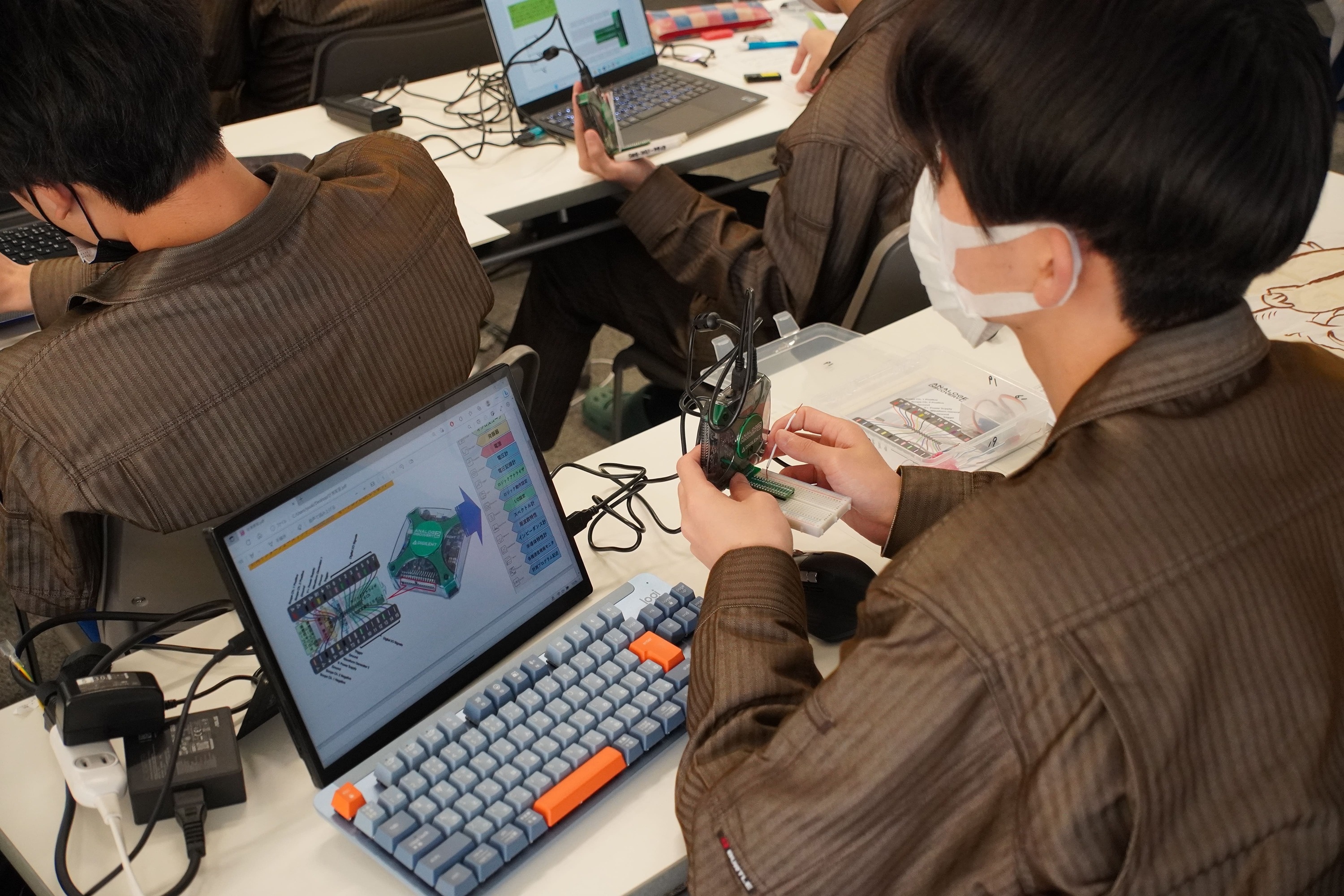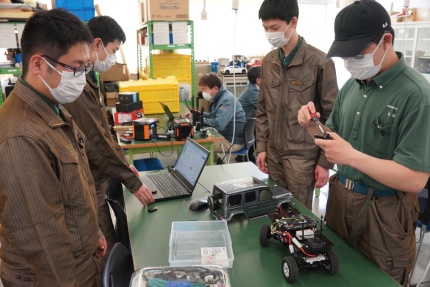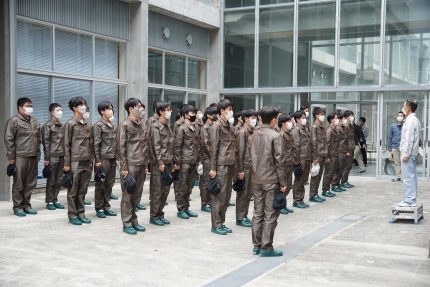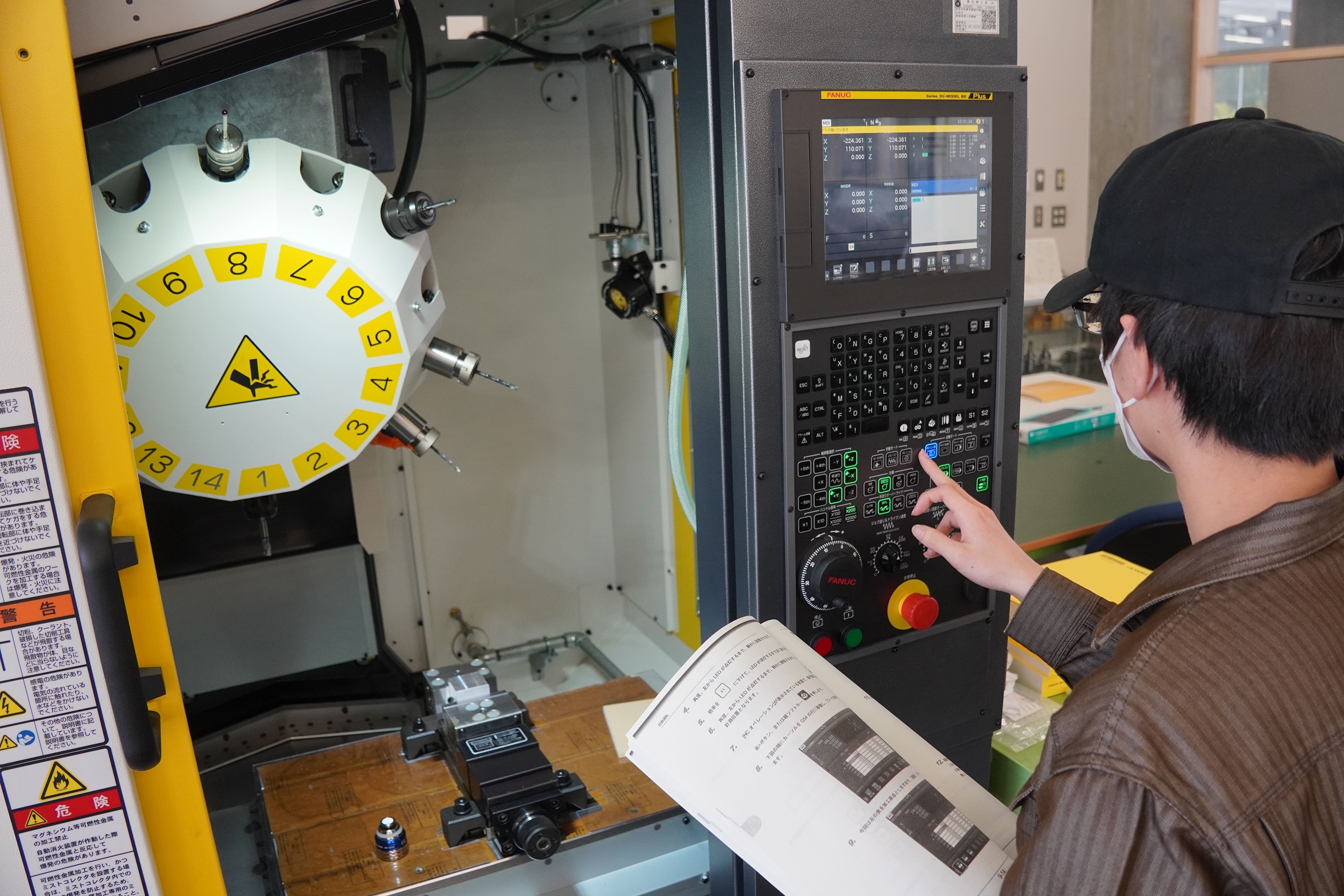Department/Course 2 Academic Years, from April 2022

Courses (outline)
Automobile and Aircraft Technology Course (10 students per year)
This course aims to develop students with advanced industrial skills related to the manufacture of transportation machinery, including the structure and mechanics of automobiles and aircraft, and automated processing technology.
Electricity and Electrical Control Course (10 students per year)
This course aims to develop students’ knowledge and understanding of advanced technologies related to the electric energy industry, such as control technologies for electric power systems and electrical equipment for power generation and transmission.
Information and IT Course (10 students per year)
This course aims to develop students’ abilities and skills using advanced technologies related to information and communications, such as information processing technologies represented by AI and IoT.
Electronics and Robotics Course (10 students per year)
This course aims to develop students who are equipped with abilities and skills using advanced technologies related to the digitalization of production sites, such as semiconductors, electronic circuit boards, signal processing, and robotic technologies.
Curriculum
Common subjects
| First Year Students |
Written Expression I, II / Linear Algebra I, II / Differentiation and Integration I, II / Physics I, II / English Communication I, II / Physical Education Practice I, II / Production Management Technology I / Data Science / Control Engineering I / Safety Engineering / Career Planning / General Seminar I / CAD Practice / General Practice I |
|---|---|
| Second Year Students |
Basic Humanities, Basic Social Sciences, Asian Culture, English Communication II, IV, Chinese, Physical Education III, IV, Production Management Technology II, Control Engineering II, Ethics for Engineers, Comprehensive Exercise II, Comprehensive Practice II |
Specialized Subjects
| Automobile & Aerospace Technology Course | Mechanical Drawing / Materials Science / Mechanics of Materials I, II / Mechanisms of Machines / Thermodynamics / Fluid Mechanics / Automobile Engineering I, II / Aerospace Engineering I, II / Electrical Theory / Measurement / Basic Programming / Network Systems / Automobile & Aerospace Practice I, II |
|---|---|
| Electricity and Electrical Control Course | Electrical Circuits I, II / Electric Magnetism I, II / Electronic Circuits I, II / Digital Circuits / Electrical Measurement / Electrical Equipment / Communication Engineering / Electric Power Technology / Electrical Regulations and Construction Management / Power Electronics / Programming / Applied Control / Electrical and Control Practice I, II |
| Information and IT Course | Science and Technology Literacy / IT Engineering Basics / Computer Architecture / Information Communication and Networks / Software Engineering / Digital Circuits I, II / IT and AI Mathematics Basics / Algorithm and Data Processing / Electronic Circuits / Digital Signal Processing / Language Design Basics / Information Theory / IT Application Technology Computer Application Analysis/ Information and IT Practicum I, II |
| Electronics and Robotics Course | Mechanical Drawing / Materials Science / Mechanics of Materials I, II / Mechanisms of Machines / Robotics / Electrical Theory / Measurement / Electronic Circuits I, II / Programming I, II / Power Electronics / Network Systems / Applied Control / Electronics and Robotics Training I, II |
Practical training

Course practical training
This course is taught by professionals in the field of manufacturing, such as engineers from companies and WorldSkills athletes. Students can learn cutting-edge technologies and skills and acquire practical skills.
- Cutting practice using a machining center (5-axis)
- Practical training in controlling a synchronous generator using an operation panel
- Programming using C language and Python
- FA practice using COBOTTA, a human-collaborative robot
Comprehensive training
Combining the strengths of each course. Students are divided into groups according to research themes and practice manufacturing in cooperation with group members.
- Pursuit and practice of advanced manufacturing skills "Mechatronics”
- Research and practice of new mobility utilizing Li battery and FC energy
- Development and practice of preview sensors for automatic driving support
- Research and practice of flying objects and CANSAT
Main Career Pathways
In addition to a wide range of employment opportunities, mainly in technical and engineering occupations in the manufacturing industry, students can also transfer to four-year universities.
What is a National Strategic Special Zone?

A National Strategic Special Zone is an initiative to comprehensively and intensively promote regulatory reforms from the perspective of strengthening the international competitiveness of industries, and promoting the formation of bases for international economic activities. The Major Course of Study has been publicly established and privatized (designated management corporation: Meijo University Educational Corporation) since April 2017, enabling education that specifically and promptly responds to trends and needs of production sites, in cooperation with companies and universities.
Qualifications
Students can take on the challenge of acquiring a variety of qualifications, such as technical proficiency tests (mechanical maintenance (mechanical and electrical), mechanical inspection, sequence control, ordinary lathe, CAD drafting, mechanical assembly and finishing, electronic device assembly), electrician, Microsoft Office Specialist, chief electrical engineer, hazardous materials handler, quality control, information processing engineer, industrial engineering, and English proficiency tests. You can take on the challenge of acquiring various certifications.
Comprehensive Training
Students acquire the qualities necessary to become leaders through a wide variety of lectures and classes to learn working manners, stress management skills, and communication skills.
Cultivation of Human Potential
As the saying goes, "Manufacturing is a way of making people," and this major focuses on teaching students how to improve their personal qualities, such as lifestyle, personal grooming, and greetings.
Fostering leaders in the field of production
As the first school in Japan to be designated as a National Strategic Special Zone, we provide next-generation education that cannot be found anywhere else.
Three Strengths of the Major Course
- Nation's leading practical training facilities
- Practical training by professionals in the manufacturing field
- Well-developed career paths
Achievements in various competitions (FY2022)
Participation in the Avian Man Contest
In July 2022, we participated in the 44th Avian Contest 2022 held at Lake Biwa in the glider category. The record was 136.12m, and we received the FRESHBIRDMAN Award.
Young people's manufacturing competition
In August 2022, we competed in the 17th Young Manufacturing Competition held in Hiroshima Prefecture. We received a silver award in the "Lathe" category, a bronze award in the "Mechanical Drawing (CAD)" category, and a fighting spirit award in the "Mechatronics" category.
World Green Challenge
In August 2022, a first-year team competed in the WGC mini solar car class held in Oogata Village, Akita Prefecture. The team won the overall championship for the third year in a row.
Catch Robot Battle Contest
In September 2022, the General Practice Team participated in the Catch Robot Battle Contest held in Kyoto, Japan. 2nd year students won the 2nd place and 1st year students won the Judges' Special Award.
Participation in the WorldSkills Competition
The first-year students participated in the 60th WorldSkills Competition held at Makuhari Messe in Chiba Prefecture, winning the Gold Award in the web design category.
Comprehensive practical training themes (2022)

Year 1
- Acquisition of mechanical system skills and sterling technology I (milling, CAD)
- Pursuit and practice of electrical and advanced manufacturing skills (mechatronics, web design, IT network)
- Basic research and practice for aircraft manufacturing (Bird Man Contest Challenge I)
- Research and practice of robot car control by GPS
- Research and practice of eco-mobility technology and renewable energy I
- Development and Practice of Preview Sensor for Automatic Driving Assistance I
- Development and Production of Advanced Small Robot
- Acquisition of creative and development skills for RoboCup competition
- Development and intellectual property of agri-technology devices
Year 2
- Acquisition of mechanical system skills and Stirling Technology II (lathe and CAD)
- Pursuit and practice of electrical systems and advanced manufacturing skills (robotics)
- Study and practice of eco-mobility technology and renewable energy II
- Research and practice of flying objects and CANSAT
- Research and practice of new mobility utilizing next generation energy and advanced technology
- Research and Practice of Aircraft Manufacturing Technology (Bird Man Contest Challenge II)
- Development and Practice of Preview Sensor for Automatic Driving Assistance II
- Research and practice of Denso advanced robot control technology
- Research and Development of Welfare Equipment
Year One of the Major
| April | Entrance and commencement ceremony, orientation |
|---|---|
| June | June 1st orientation for the major |
| August | First semester examinations, summer vacation, internship |
| September | Summer Vacation, Start of Second Semester Classes, Selection of Specially Recommended Students for Admission |
| October | 2nd orientation for the major |
| November | General Admission Selection, Sports Festival |
| December | Winter Vacation |
| January | Winter Vacation, Career guidance, Presentation of Study Results, Late Semester Examinations, Lifesaving Seminar |
| February | Industry Research Seminar, Alumni Association Induction Ceremony |
| March | Graduation Ceremony, Opening Ceremony, School Entrance Day for successful applicants |
Timetable
| 1st period | 9:10 - 10:40 |
|---|---|
| 2nd Period | 10:50 - 12:20 |
| Lunch | 12:20 - 13:00 |
| 3rd Period | 13:00 - 14:30 |
| 4th Period | 14:40 - 16:10 |
| Cleaning | 16:10 - 16:20 |
Tuition and Fees
1st year students: approx. 250,000 yen, 2nd year students: approx. 220,000 yen
(This is a rough estimate that includes the entrance fee, tuition, and the cost of purchasing textbooks and practical training clothes. (The major has its own scholarship and support system.)
Access
Nagoya Municipal Subway - Higashiyama Line to "Hoshigaoka Station", 4-minute walk from Exit 2
Aichi Prefectural Aichi Comprehensive Technical High School, Major in Engineering Designated Administrative Institution Meijo University
Please visit our website
- Click here for the homepage
https://www.aichi-te-ad.jp/ - Click here to watch the introduction video
https://www.aichi-te-ad.jp/school-information/movie.html - Click here for information about daily life on campus
https://www.aichi-te-ad.jp/gallery/
